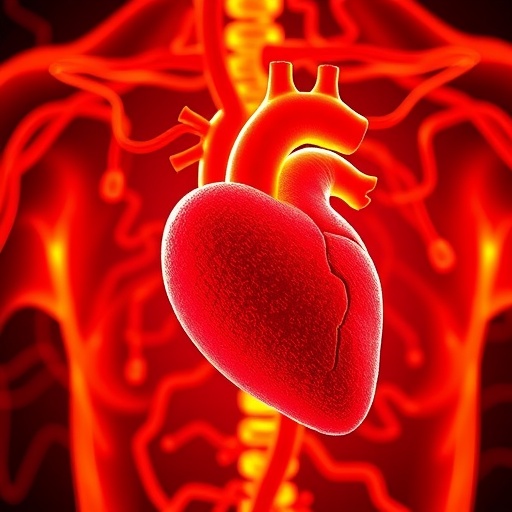In recent years, researchers have made significant strides in understanding the relationship between various neural pathways and cardiovascular health. A particularly intriguing development in this field is the research conducted by Zhang and colleagues, which has illuminated the mechanisms by which renal denervation may play a role in mitigating cardiac inflammation. This study emphasizes the afferent renal-splenic nerve axis as a crucial player in this complex interplay, especially in the context of myocardial ischemic injury.
The heart and kidneys have long been recognized as interconnected organs, with dysfunction in one often affecting the other. This concept forms the basis of the research led by Zhang, Gao, and Zhang, who specifically delve into how interrupting the neural connections between the kidneys and the heart may produce beneficial effects. Their findings suggest that renal denervation, a procedure traditionally used in treating hypertension, could have far-reaching implications for cardiac health, particularly after episodes of ischemia.
At the heart of this investigation is the role of inflammation following myocardial ischemic injury, a condition characterized by the temporary loss of blood flow to the heart muscle, resulting in damage and triggering inflammatory responses. This inflammatory cascade is known to exacerbate cardiac injury and can lead to further complications, including heart failure. By exploring the afferent renal-splenic nerve axis, the researchers propose a novel pathway through which renal denervation can attenuate these harmful inflammatory responses.
The study presents evidence that renal denervation modulates the sympathetic nervous system’s activity. The sympathetic nervous system, which is responsible for the ‘fight or flight’ response, becomes overactive in the face of stress or injury. This heightened activity can contribute to the inflammatory processes that worsen cardiac damage. By disrupting the signals sent from the kidneys to the heart, renal denervation appears to dampen this sympathetic overactivity, providing a protective effect against the ravages of inflammation.
One fascinating aspect of the research lies in the implications of the afferent renal-splenic nerve axis. This axis is a pathway of communication that links the renal system to the spleen and subsequently to the heart. The study suggests that renal denervation alters the signaling along this axis, resulting in a decrease in pro-inflammatory cytokines. These cytokines are molecules that facilitate inflammation; their reduction in the context of cardiac injury could halt the progression of further damage, making renal denervation a potential therapeutic avenue for cardiac patients.
Moreover, the findings detail how renal denervation influences both the acute and chronic phases of inflammatory responses after myocardial ischemic events. Acute inflammation is a natural and necessary response to injury, but when it becomes exaggerated or chronic, it can lead to significant harm. Zhang et al. explore how renal denervation might recalibrate this response, allowing for a balanced healing process rather than overwhelming inflammation that contributes to ongoing tissue damage.
Interestingly, this study taps into the emerging concept of neuroimmunology, where the focus is on the interaction between the nervous system and the immune response. By clarifying the mechanisms at play in the afferent renal-splenic nerve axis, this research opens doors to innovative therapeutic strategies that harness neural pathways to modulate inflammatory responses. This perspective could transform how we approach treatments for cardiac conditions, particularly in cases where inflammation drives pathology.
Clinical implications of this research could be profound. As the medical community seeks effective strategies to combat heart disease, integrating renal denervation could augment existing therapies aimed at managing ischemic heart conditions. Patients suffering from recurrent cardiac events may benefit from a dual approach—targeting not only the cardiovascular system but also the neural mechanisms that influence inflammation and healing.
Importantly, additional research is necessary to explore the long-term effects of renal denervation on cardiac health. While the current findings are promising, understanding the durability of these benefits and the potential for adverse effects remains critical. As researchers continue to investigate this fascinating intersection of renal and cardiac health, clinicians may soon have new tools at their disposal.
This investigation conducted by Zhang and colleagues is a timely reminder of the intricate connections within our bodies. By studying one organ system’s influence on another, scientists can uncover new layers of complexity that may lead to groundbreaking treatments. As we push the boundaries of our understanding, every new discovery brings us one step closer to more effective interventions for diseases that continue to challenge healthcare systems worldwide.
In conclusion, the exploration of renal denervation’s impact on cardiac inflammation highlights the importance of innovative perspectives in medical research. The afferent renal-splenic nerve axis emerges as a fascinating target for future studies, underscoring the potential for interdisciplinary approaches in tackling complex health issues. By weaving together insights from neuroscience and cardiology, researchers like Zhang and their team are paving the way for revolutionary treatments that could redefine how we manage heart disease and improve patient outcomes.
This research does not merely abide by existing paradigms but prompts a reevaluation of treatment methodologies in cardiac care, opening avenues for novel therapeutic strategies that embrace the interconnectedness of bodily systems. As we await further developments in this field, it is clear that the integration of neurological and cardiovascular health will be essential in advancing medical science and improving the quality of life for countless individuals.
Subject of Research: The effect of renal denervation on cardiac inflammatory responses via the afferent renal-splenic nerve axis after myocardial ischemic injury.
Article Title: Renal denervation attenuates cardiac inflammatory responses via the afferent renal-splenic nerve axis after myocardial ischemic injury.
Article References: Zhang, Y., Gao, X., Zhang, B. et al. Renal denervation attenuates cardiac inflammatory responses via the afferent renal-splenic nerve axis after myocardial ischemic injury. J Transl Med 23, 1320 (2025). https://doi.org/10.1186/s12967-025-07356-8
Image Credits: AI Generated
DOI: https://doi.org/10.1186/s12967-025-07356-8
Keywords: renal denervation, cardiac inflammation, afferent renal-splenic nerve axis, myocardial ischemic injury, sympathetic nervous system, neuroimmunology, therapeutic strategies.




